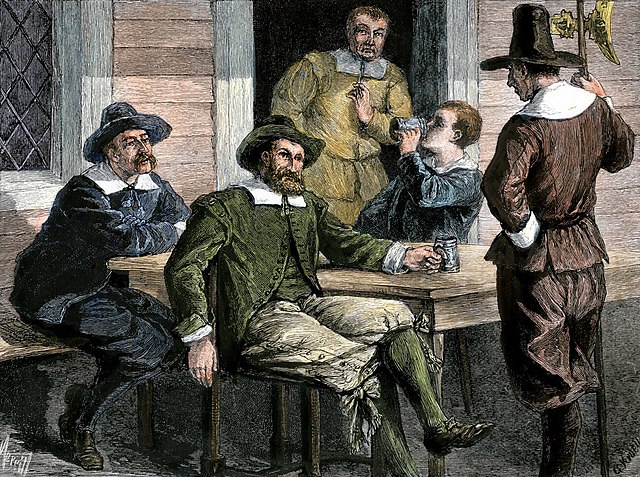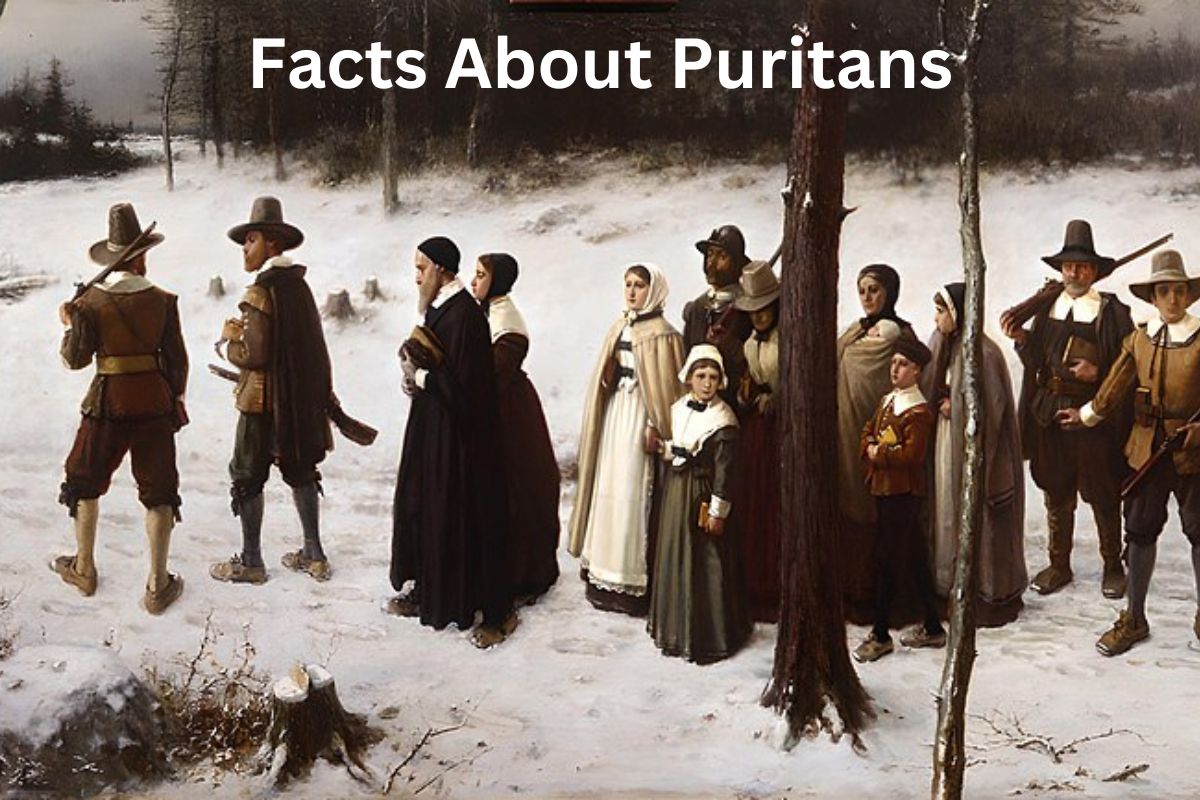The Puritans were a group of English Protestants who emerged in the 16th and 17th centuries as a movement seeking to reform the Church of England.
Inspired by the Protestant Reformation, they aimed to purify the church from what they perceived as remnants of Catholic practices and return to a more pure and biblical form of worship.
The term “Puritan” initially carried a negative connotation but eventually became associated with their distinct religious and social movement.
The Puritans emphasized a strict interpretation of the Bible and placed a strong emphasis on personal piety, individual responsibility, and a disciplined lifestyle.
Also Read: Famous Puritans
They believed in the doctrine of predestination, which held that God predestined certain individuals to be saved and others to be damned. This belief system led to a deep sense of religious introspection and a constant striving for evidence of one’s own salvation.
Puritans Facts
1. The Puritans were a group of English Protestants who sought to purify the Church of England
The Puritans were a group of English Protestants who sought to purify the Church of England from within during the 16th and 17th centuries.

The term “Puritan” originated as a nickname used by critics who accused them of being overly strict and austere in their religious beliefs and practices. However, the Puritans themselves embraced the label and saw it as a badge of honor.
2. The term “Puritan” was initially used as a pejorative label
The Puritan movement emerged in the late 16th century as a response to what they perceived as corruption and remnants of Catholic practices within the Church of England.
Also Read: What’s the Difference Between Puritans and Quakers?
They sought to reform the church according to what they believed were the pure teachings of the Bible. Puritans emphasized the importance of personal religious experience, the authority of Scripture, and the need for a disciplined and moral society.
3. Puritans believed in a strict interpretation of the Bible and placed a strong emphasis on personal piety
Puritans believed in a strict interpretation of the Bible and placed a strong emphasis on personal piety, individual responsibility, and a disciplined lifestyle.
They believed that all aspects of life should be governed by religious principles, including work, family, and social interactions. Their aim was to create a society that exemplified Christian virtues and upheld a high moral standard.
4. Many Puritans migrated from England to the American colonies
Many Puritans migrated from England to the American colonies, seeking religious freedom and the opportunity to establish a pure Christian society. The Massachusetts Bay Colony, founded in 1630, became a significant Puritan stronghold.
Other colonies, such as Connecticut, Rhode Island, and New Hampshire, also attracted Puritan settlers. The Puritans’ desire to establish religious communities played a crucial role in shaping the early American colonies.

5. The most well-known Puritan settlement in America was the Massachusetts Bay Colony
The Massachusetts Bay Colony was established as a theocratic society, where church and state were closely intertwined. Puritan leaders, such as John Winthrop, saw the colony as a “City upon a Hill,” a model Christian community that would serve as an example to others.
Puritan society in the colonies was characterized by strict moral codes, communal responsibility, and a collective sense of purpose. The church played a central role in community life, and religious leaders had significant influence over both religious and secular matters.
6. Puritan society was highly structured and governed by strict moral codes
Puritan society was highly structured and governed by strict moral codes. Activities such as gambling, theater-going, and dancing were frowned upon and sometimes prohibited. The Puritans believed in leading a simple and disciplined life, free from worldly distractions.
They considered such activities as potential sources of temptation and viewed them as sinful or wasteful. Instead, they encouraged activities centered around worship, study, and work.
7. Puritan worship services were characterized by simplicity, focus on preaching, and the study of Scripture
Puritan worship services were characterized by simplicity, focus on preaching, and the study of Scripture. They rejected elaborate rituals and ceremonies present in the Church of England.
The sermon held a central place in their religious gatherings, with ministers delivering long and intense sermons aimed at teaching and admonishing the congregation. Prayer and singing of psalms were also important aspects of Puritan worship.
8. Puritans believed in the doctrine of predestination
Puritans believed in the doctrine of predestination, which held that God predestined certain individuals to be saved and others to be damned. They believed that human beings were inherently sinful and that salvation could only be achieved through God’s grace.
This belief led to a strong sense of religious introspection and a constant striving for evidence of one’s own salvation. The idea of predestination also shaped their understanding of societal hierarchies and their perception of success or misfortune as indications of divine favor or disfavor.
9. Puritans placed a strong emphasis on education and literacy
Puritans placed a strong emphasis on education and literacy. They established schools and universities, such as Harvard College, to ensure that people could read and understand the Bible.
The ability to study and interpret Scripture was seen as essential for personal piety and a well-informed religious community. Puritan parents were encouraged to educate their children, both boys and girls, to ensure they could read and engage with religious texts.
10. Puritan women had distinct roles within the household and society
Puritan women had distinct roles within the household and society. They were expected to be obedient to their husbands, raise children, and maintain domestic order.
Women’s primary role was considered to be that of a wife and mother, responsible for the spiritual and moral upbringing of their families.
While women did not hold formal positions of authority within the church or government, they played an influential role within the home and had certain rights and responsibilities. Puritan women were also active in charitable endeavors and contributed to the community’s social fabric.
11. The Salem witch trials, which took place in Massachusetts in 1692-1693, were a dark chapter in Puritan history
The Salem witch trials, which took place in Massachusetts in 1692-1693, were a dark chapter in Puritan history. Accusations of witchcraft led to the execution of several individuals.
The trials were marked by mass hysteria, fueled by religious fervor and a belief in supernatural forces. Many factors contributed to the witch trials, including social tensions, economic pressures, and a rigid worldview that viewed any deviation from societal norms as potentially Satanic.
The trials serve as a stark reminder of the dangers of religious fanaticism and the consequences of unchecked fear and intolerance.
12. Puritans had a strong work ethic and believed in the virtue of hard work
Puritans had a strong work ethic and believed in the virtue of hard work. They saw labor as a means of serving God and fulfilling one’s religious duties. Puritans emphasized the concept of the “Protestant work ethic,” which linked economic success and prosperity to godliness.
They believed that diligent labor, thriftiness, and responsible stewardship of resources were important aspects of their Christian faith. This belief in the value of hard work and economic productivity contributed to the development of capitalism in America.
13. Puritans had a significant influence on American culture and politics
Puritans had a significant influence on American culture and politics. Their values, including individualism, self-reliance, and the pursuit of moral virtue, contributed to the development of the American identity.
The emphasis on personal responsibility and the belief in the importance of community and social order helped shape American ideals of democracy, civic duty, and social equality. The legacy of Puritanism can be seen in various aspects of American society, including its legal system, educational institutions, and cultural norms.
14. Over time, Puritanism declined as a distinct religious movement
Over time, Puritanism declined as a distinct religious movement, but its influence continued to shape American society through subsequent generations. As new waves of immigrants arrived in America and religious diversity increased, the strict practices and beliefs of the Puritans gave way to a more pluralistic society.
However, the Puritan legacy persisted in the form of religious freedom and the separation of church and state, which became fundamental principles in the United States Constitution.
The Puritans’ quest for religious liberty laid the foundation for the First Amendment, protecting the freedom of religion and expression.
15. The legacy of the Puritans can be seen in the cultural and moral traditions of the United States
The legacy of the Puritans can be seen in the cultural and moral traditions of the United States, as well as in the principles of religious freedom and individual liberty that are fundamental to American society.
Puritan ideals of hard work, discipline, and moral responsibility continue to influence American attitudes toward work, success, and personal morality.
The Puritans’ commitment to education also laid the groundwork for the development of a robust educational system in the United States. Their influence on American culture and politics continues to shape the nation’s values and institutions to this day.
